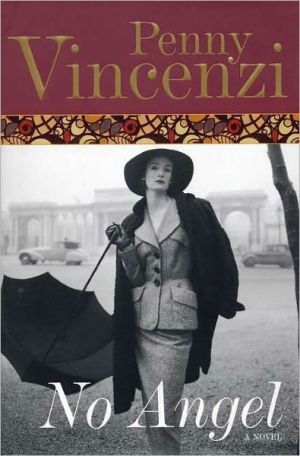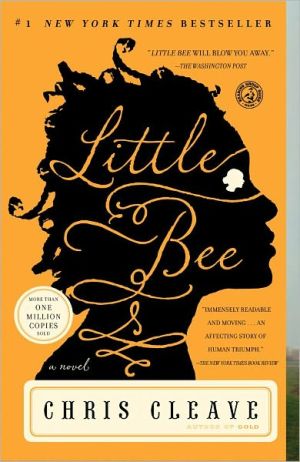No Angel
With more than 3.5 million copies sold, Penny Vincenzi is one of the world's preeminent writers of popular fiction-and American readers no longer have to miss out on the fun. With the publication of No Angel, a novel introducing the engaging cast of characters in the Lytton family, Overlook opens a thrilling new dimension to this author's already illustrious career. \ No Angel is an irresistibly sweeping saga of power, family politics, and passion-a riveting drama and a fervent love story....
Search in google:
Set against the tumultuous background of the First World War, "No Angel" is an absorbing audiobook packed with believable characters and satisfyingly extreme villains, eccentrics, and manipulators. Unabridged. 23 CDs.The Washington PostPenny Vincenzi's No Angel is a rich bonbon of a book. Readers who devour sagas and love romance will find every page irresistible. And as for others? Well, you might feel a little undernourished, but still I'm betting that you can't help but gorge yourself on at least some of its guilty pleasures. — Caroline Leavitt
\ \ No Angel\ \ \ \ \ By Penny Vincenzi\ \ \ THE OVERLOOK PRESS\ \ \ \ Copyright © 2000\ \ Penny Vincenzi\ All right reserved.\ \ \ ISBN: 1-58567-481-8\ \ \ \ \ \ \ Chapter One\ \ \ Celia stood at the altar, smiling into the face of her bridegroom and \ wondered if she was about to test his vow to cherish her in sickness and \ in health rather sooner than he might have imagined. She really did feel \ as if she was going to vomit: there and then, in front of the \ congregation, the vicar, the choir. This was truly the stuff of which \ nightmares were made. She closed her eyes briefly, took a very deep \ breath, swallowed; heard dimly through her swimmy clammy nausea \ the vicar saying, 'I now pronounce you man and wife', and somehow \ the fact that she had done it, managed this marriage, managed this day, \ that she was married to Oliver Lytton, whom she loved so much, and \ that no one could change anything now, made her feel better. She saw \ Oliver's eyes on her, tender, but slightly anxious, having observed her \ faintness, and she managed to smile again before sinking gratefully on to \ her knees for the blessing. \ Not an ideal condition for a bride to be in, almost three months'\ pregnant; but then if she hadn't been pregnant, her father would never\ have allowed her to marry Oliver anyway. It had been a fairly drastic\ measure; but it had worked. As she had known it would. And it had\ certainly been fun: she had enjoyed becoming pregnant a lot.\ The blessing was over now; they were being ushered into the vestry\ to sign the register. She felt Oliver's hand taking hers, and glanced over\ her shoulder at the group following them. There were her parents, her\ father fiercely stem, the old hypocrite: she'd grown up seeing pretty\ housemaid after pretty housemaid banished from the house, her mother,\ staunchly smiling, Oliver's frail old father, leaning on his cane supported\ by his sister Margaret, and just behind them, Oliver's two brothers,\ Robert rather stiff and formal and slightly portly, Jack, the youngest,\ absurdly handsome, with his brilliant blue eyes restlessly exploring the\ congregation for any pretty faces. Beyond them were the guests,\ admittedly rather few, just very close friends and family, and the people\ from the village and the estate, who of course wouldn't have missed her\ being married for anything. She knew that in some ways her mother\ minded about that more than about anything else really, that it wasn't a\ huge wedding like her sister Caroline's, with three hundred guests at St\ Margaret's Westminster, but a quiet affair in the village church. Well,\ she didn't mind. She didn't mind in the very least. She had married\ Oliver: she had got her way.\ \ 'Of course you can't marry him,' her mother had said, 'he has no\ money, no position, no house even, your father won't hear of it.'\ Her father did hear about it, about her wish to marry Oliver, because\ she made him listen; but he reiterated everything her mother had said.\ 'Ridiculous. Throwing your life away. You want to marry properly,\ Celia, into your own class, someone who can keep you and support you\ in a reasonable way.'\ She said she did not want to marry properly, she wanted to marry\ Oliver, because she loved him; that he had a brilliant future, that his\ father owned a successful publishing house in London which would be\ his one day.\ 'Successful, nonsense,' her father said, 'if it was successful he wouldn't\ be living in Hampstead would he? With nowhere in the country. No,\ darling,' for he adored her, his youngest, a late flower in his life, 'you\ find someone suitable and you can get married straight away. That's\ what you really want, I know, a home and husband and babies; it's\ natural, I wouldn't dream of stopping you. But it's got to be someone\ who's right for you. This fellow can't even ride a horse.'\ Things had got much worse after that; she had shouted, raged, sworn\ she would never marry anyone else, and they had shouted and raged\ back at her, telling her she was being ridiculous, that she had no idea\ what she was talking about, that she clearly had no idea what marriage\ was about, that it was a serious matter, a considerable undertaking, not\ some absurd notion about love.\ 'Very over-rated, love,' her mother said briskly, 'doesn't last, Celia,\ not what you're talking about. And when it's gone, you need other\ things, believe me. Like a decent home to bring up your children in.\ Marriage is a business and it works best when both parties see it that\ way.'\ \ Celia was just eighteen years old when she met 0liver Lytton: she had\ looked at him across the room at a luncheon party in London given by a\ rather bohemian friend of her sister's and fallen helplessly in love with\ him, even before they had spoken a single word. Afterwards, trying to\ analyse that sensation, to explain it to herself, she could only feel she had\ been invaded by an intense emotion, taken hold of, shaken by it; she felt\ immediately changed, the focus of her life suddenly found. It was\ primarily an emotional reaction to him, a desire to be with him, close to\ him in every way, not mere physical attraction which she had\ experienced to some degree before; he was quite extraordinarily\ handsome, of course, tall and rather serious, indeed almost solemn-looking,\ with fair hair, blue eyes, and a glorious smile that entirely\ changed his face, bringing to it not just a softness, but a merriment, a\ sense of great joie de vivre.\ But he was more than handsome, he was charming, beautifully\ mannered, clearly very intelligent, with a great deal more to talk about\ than most of the young men she had met. Indeed he talked about things\ she had never heard a young man speak of before, of books and\ literature, of plays and art exhibitions. He asked her if she had been to\ Florence and Paris and when she said she had, asked her then which\ galleries she had most enjoyed and admired. He also - which she found\ more engaging than any of the rest - had a way of treating her as if she\ were as clever and as well-read as he. Celia, who was of a generation\ and class of girls educated at home by governesses, was entirely charmed\ by this. She had been brought up in the only way her parents knew and\ recognised: to marry someone from her own social class, and to lead a\ life exactly the same as her mother's, raising a family and running a\ household; from the moment she set eyes on Oliver Lytton, she knew\ this was not what she wanted.\ She was the youngest daughter of a very old and socially impeccable\ family. The Beckenhams dated back to the sixteenth century, as her\ mother, the Countess of Beckenham, was fond of telling everyone; the\ family had a glorious and quite grand seventeenth century house and\ estate called Ashingham in Buckinghamshire, not far from Beaconsfield,\ and a very beautiful town house in Clarges Street, Mayfair. They were\ extremely rich and concerned only with running their estate, conserving\ their assets, and enjoying what was mostly a country life. Lord\ Beckenham ran the home farm, hunted and shot a great deal in the\ winter, and fished in the summer, Lady Beckenham socialised both in\ London and the country, rode, played cards, organised her staff, and - rather\ more reluctantly - saw to the upkeep of her extensive wardrobe.\ Books, like pictures, were things which covered the Beckenham walls\ and were appreciated for their value rather more than for their content;\ talk at their dinner table centred around their own lives, rather than\ around abstract matters such as art, literature and philosophy.\ Confronted by a daughter who professed herself - after only three\ months' short acquaintance - to be in love with someone who, by their\ standards, was not only a pauper, but almost as unfamiliar to them as a\ Zulu warrior, they were genuinely appalled and anxious for her.\ Celia could see that they were entirely serious in their opposition; she\ supposed she could marry Oliver when she was twenty-one, but that\ was unimaginably far off, three years away. And so, staring into the\ darkness through her bedroom window late one night, her eyes sore\ with weeping, wondering what on earth she could do, she had suddenly\ found it: the solution. The breathtakingly, dazzlingly simple solution.\ She would become pregnant and then they would have to let her marry\ him. The more she thought about it, the more sensible it seemed. The\ only alternative was running away; but Oliver had rejected that sweetly\ but firmly.\ 'It would cause too much anxiety, hurt too many people, my family\ as well as yours. I don't want us to build our life together on other\ people's unhappiness.'\ His gentleness was only one of the many things she loved about him.\ Just the same, she thought that night, he would not accede to this\ plan too easily. He would argue that pregnancy would also cause great\ distress; he would not see that they deserved it, her blind, insensitive,\ hypocritical parents: hardly models of marital virtue themselves, her\ father with the housemaids, her mother with her lover of many years.\ Her sister, Caroline had told her about him, the year before, at her own\ coming out ball at Ashingham. Caroline had had too much champagne\ and was standing with Celia between dances, looking across at their\ parents talking animatedly to one another. Celia had said impulsively\ how sweet it was that they were still so happy together, in spite of the\ housemaids, and Caroline had said that if they were, much of the credit\ should go to George Paget. George Paget and his rather plain wife,\ Vera, were old family friends; pressed to explain precisely what she\ meant, Caroline said that George had been her mother's lover for over\ ten years. Half shocked, half fascinated, Celia begged to be told more,\ but Caroline laughed at her for being so innocent and launched herelf\ on to the dance floor with her husband's best friend. But next day she\ had relented, remorseful at disillusioning her little sister, said she mustn't\ worry about it, that it wasn't important.\ 'Mama will always keep the rules.'\ 'What rules?' Celia said.\ 'Society's rules,' said Caroline, patiently reassuring. 'Discretion,\ manners, those sorts of things. She would never leave Papa. To them\ marriage is unshakable. What they do, what all society does, is make\ marriage more pleasant, more interesting. Stronger, actually, I would\ say.'\ 'And - would - would you make your marriage more pleasant in that\ way?' Celia asked and Caroline laughed and said that at the moment,\ hers was fairly pleasant anyway.\ 'But yes, I suppose I would. If Arthur became dull, or found pleasure\ of his own elsewhere. Don't look so shocked, Celia, you really are an\ innocent aren't you? I heard it said the other day that Mrs Keppel, you\ know, the king's mistress, has turned adultery into an art form. That\ seems quite a nice achievement to me.'\ Celia had still felt shocked, despite the reassurance. When she got\ married, she knew it would be for love and for life.\ So - Oliver must not realise the full extent of her plan. She knew\ exactly how one became pregnant; her mother had instructed her with\ great and unusual forthrightness on the subject when Celia had her first\ menstrual period, and besides, she had grown up in the country, she had\ seen sheep and even horses copulating, had been present at the birth of\ lambs, and had spent all of one night in the sweet steamy stench of the\ stables with her father and his groom, as her father's favourite mare\ dropped her foal. She had no doubt that she would be able to persuade\ Oliver into making love to her; as well as being absurdly romantic,\ constantly sending her poems, flowers, love letters pages long, he was\ passionately affectionate with her, his kisses far from chaste, intensely\ arousing - to them both.\ Celia had rather more freedom than many girls of her age. Having\ raised six children, her mother had become weary of the task, and was in\ any case extremely busy and inclined to leave Celia to her own affairs.\ When Oliver came for the weekend at Ashingham, invited to join one\ of the Beckenham house parties as Celia's guest, they were able during\ the day (Oliver being quite unable to join in any sporting activities) to\ roam the grounds on their own and after dinner to sit in the library on\ their own talking. The roaming and talking had led to a great deal of\ kissing; Celia had found she quite literally could not have enough of it,\ and was yearning for more - as, quite plainly, was Oliver.\ She had not experienced passion before, either in herself or any of the\ young men she had met; but she found she could recognise it very easily\ now. As easily as she had been able to recognise love. He had been very\ respectful of her virtue, naturally, but she was absolutely confident that\ she could persuade him to take their physical relationship forwards\ without any difficulty whatsoever. Of course he would be anxious, not\ only that they would be found out, but that she would become\ pregnant. But she could reassure him about that, tell him some lie - she\ wasn't sure what; she believed there were times in the month when you\ were supposed not to be able to become pregnant, she had read it in\ some book in her mother's room - and then when it happened - well\ there would be nothing more to worry about.\ She was very precise in her plans: she pretended to have acquiesced to\ her parents' views, to have come to see that Oliver was not the right man\ for her - although not too swiftly, lest she arouse their suspicion - and\ stayed at home dutifully for several weeks, while writing to Oliver every\ day. Then she went to London to stay with Caroline for a few days,\ ostensibly to do some shopping, and it had all been absurdly easy. Caroline\ had discovered that she was pregnant herself, and was wretchedly sick,\ totally uninterested in what her younger sister was doing, and unwilling as\ well as unable to chaperone her. Absences of two or three hours while\ Celia was officially shopping, seeing dressmakers, having fittings for the\ London Season, but actually discovering the raptures of being in bed with\ her lover, went almost unnoticed.\ Celia had been right, Oliver was initially resistant to the risks of making\ love to her; but a mixture of emotional blackmail and a determined\ onslaught on his senses worked quite quickly. She would meet him at the\ big house in Hampstead, where he lived with his father, in the early\ afternoon; his father still spent every day at the publishing house, and it\ was easy for Oliver to pretend to be lunching with authors, or visiting\ artists' studios. They would go upstairs to Oliver's room, a big, light\ book-lined affair with huge windows on the first floor, overlooking the\ Heath, and spend the next hour or so in the rather narrow almost lumpy\ bed that swiftly became paradise for Celia. They found a physical delight\ in each other almost at once; Oliver was not exactly experienced, indeed\ his own knowledge had been gained at the hands of a couple of chorus\ girls introduced by his best friend at Oxford, but it was sufficient to guide\ him through Celia's initiation.\ Continues...\ \ \ \ \ \ \ Excerpted from No Angel\ by Penny Vincenzi\ Copyright © 2000 by Penny Vincenzi.\ Excerpted by permission.\ All rights reserved. No part of this excerpt may be reproduced or reprinted without permission in writing from the publisher.\ Excerpts are provided by Dial-A-Book Inc. solely for the personal use of visitors to this web site.\ \ \
\ The Washington PostPenny Vincenzi's No Angel is a rich bonbon of a book. Readers who devour sagas and love romance will find every page irresistible. And as for others? Well, you might feel a little undernourished, but still I'm betting that you can't help but gorge yourself on at least some of its guilty pleasures. — Caroline Leavitt\ \ \ \ \ Publishers WeeklyBestselling British author Vincenzi follows the tumultuous lives of London's Lytton family through the early 20th century in her first novel to be published in the U.S. At the story's center is Lady Celia Beckenham, a strong-willed, blue-blooded beauty who forces her parents to bless her marriage to the lower-ranking Oliver Lytton, employed in the "rough world of publishing," by getting pregnant. Taking her maternal duties in stride (her ugly baby, Giles, is initially "something of a disappointment"), Celia talks her way into an editorial position at Lyttons Publishing House, and quickly proves herself a fast learner with a head full of successful ideas. As years pass and more children arrive, Celia becomes known for her editorial skills and her familial devotion. But when Oliver returns after four years of fighting in WWI, her perfect world begins to crumble he is dismayed by the books Lyttons has published under Celia's and his sister LM's guidance, and he has lost all desire for his wife. Celia seeks comfort in the arms of a handsome new author, and as she falls into an all-consuming affair, she begins to contemplate leaving Oliver: "She would have to go; go with Sebastian. Anything else was madness. She explored the decision for a few minutes, waiting for uncertainty to return. It didn't." But as Celia struggles to make her life-altering decision, events around her cause her to see herself and her family in a new light and to ponder what her life would be like if she weren't a Lytton. Through life and death, exuberance and sorrow, honor and disgrace, Vincenzi perfectly captures the intricacies of her characters and creates plots captivating enough to keep readers eyes' glued to this long and hearty saga. (Oct.) Forecast: Vincenzi has sold more than 3.5 million copies overseas, and Overlook is giving this title a big push with a 75,000 first printing and solid ad dollars; handselling to those looking to curl up with a happier doorstopper than last year's excellent but dark Crimson Petal and the White should also help. Copyright 2003 Reed Business Information.\ \ \ Library JournalIn the tradition of Barbara Taylor Bradford, popular British novelist Vincenzi writes a family saga starring Celia Lytton, a smart, ambitious woman working against stereotype during World War I. In the opening scene, when the reader finds out Celia has purposely gotten pregnant so that her aristocratic parents will let her marry Oliver Lytton, the reader knows that this is a woman who gets her way. Vincenzi takes us through 20 years in Celia's life, using historical moments as background and introducing us to wonderful supporting characters, such as her strong-willed sister-in-law, LM, and her outspoken mother, the Countess of Beckenham. All of the novel's characters are three-dimensional, and the story enthralls us as it takes us through not only the emotional life of the Lyttons but also the wheeling and dealing of their publishing house. This entertaining novel is recommended for most fiction collections. [BOMC and Literary Guild selections; see "Must-Reads for Fall," p. 40.-Ed.]-Marianne Fitzgerald, Charlotte Mecklenburg Sch. Dist., NC Copyright 2003 Reed Business Information.\ \ \ \ \ Kirkus ReviewsA first US appearance for British Vincenzi. (Overlook will also be publishing two of her previous novels: Something Dangerous and Into Temptation.) Celia, headstrong daughter of aristocratic Edwardian parents, makes the breakfast kippers spin in their silver chafing dish when she decides to marry . . . out of her class. The object of her affections is tall, blond, handsome Oliver Lytton, the offspring of a distinguished London publisher and a rather louche actress, long since decamped. Celia's outraged father points out that the man can't even ride a horse. Her practical mother adds that marriage is a business (but neglects to mention that she has been carrying on a clandestine affair for years with a friend of the family's). But Celia must and will have her way, and so she and Oliver marry, with only the family and a few loyal servants in attendance. Not the lavish society wedding Lady Beckenham had hoped for, but there's no time to waste-and Celia is delivered of Giles, a robust if ugly-looking infant, a mere six months after the ceremony. Yet there is trouble ahead, and ere long, a silver candlestick will be hurled at the nursery door. Celia is profoundly bored by the unchanging routine of motherhood, and she wants to work. Oliver demurs. "I want you to be in our home, taking care of our son, not out in the rough world of publishing." Then a collection of Queen Victoria's letters proves a temptation too powerful to resist, and Celia offers an utterly brilliant suggestion: Shall they publish a simultaneous biography? Lo, a dazzling career begins within the hallowed and fusty walls of Lyttons as our Celia swans it through the ensuing years of tremendous social upheaval, WWI, decorousinfidelity with a sexy author, and other proliferating subplots too numerous to count. Studiously avoiding latent snobbery, Vincenzi rounds out this baggy saga with a few working-class characters, whose hearts are in the right place even if their aitches are not. Overlong and overwrought, though not without a certain veddy British charm. First printing of 75,000; $50,000 ad/promo\ \








